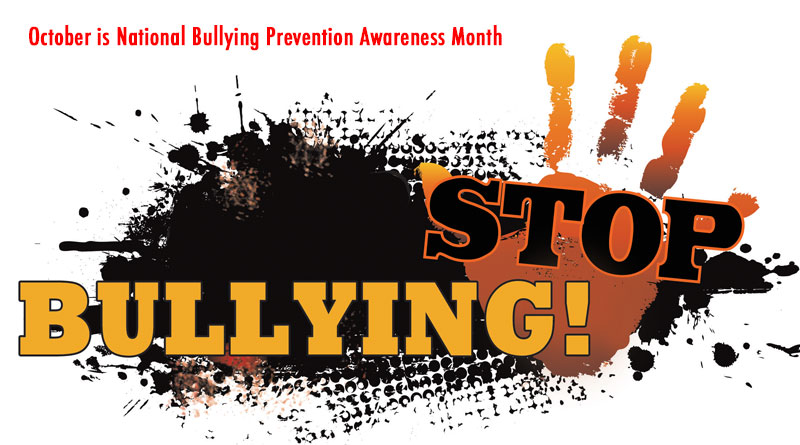October is National Bullying Prevention Awareness Month
This month, the world comes together to raise awareness for bullying prevention and to encourage communities to work together to stop bullying by increasing awareness of the prevalence and impact of bullying on all children of all ages.
Bullying is when a person is picked on over and over again by an individual or group with more power, either in terms of physical strength or social standing. Kids who are bullied can experience negative physical, school, and mental health issues. Kids who are bullied are more likely to experience depression and anxiety, increased feelings of sadness and loneliness, changes in sleep and eating patterns, and loss of interest in activities they used to enjoy, decreased academic achievement and they are more likely to miss, skip, or drop out of school.
A very small number of bullied children might retaliate through extremely violent measures. In most of the school shootings recorded recently, the shooters had a history of being bullied.
Sometimes the victim of repeated bullying cannot control the need for revenge and the situation becomes dangerous for everyone.
If you’re in a bullying situation that you think may escalate into physical violence, try to avoid being alone. Try to remain part of a group by walking home at the same time as other people or by sticking close to friends or classmates during the times that the bullying takes place.
Here are some things you can do to combat psychological and verbal bullying.
Ignore the bully and walk away. Bullies thrive on the reaction they get, and if you walk away or ignore hurtful emails or instant messages, you’re telling the bully that you just don’t care.
Hold the anger. That’s exactly the response he or she is trying to get, and want to know they have control over your emotions.
Don’t get physical. Not only are you showing your anger, but you also can never be sure what the bully will do in response. You are more likely to be hurt and get into trouble if you use violence against a bully.
Practice confidence.Practice ways to respond to the bully verbally or through your behavior. Practice feeling good about yourself.
Talk about it. It may help to talk to a guidance counselor, teacher, or friend — anyone who can give you the support you need. Talking can be a good outlet for the fears and frustrations that can build when you’re being bullied.
Parents, school staff, and other adults in the community can help kids prevent bullying by talking about it, building a safe school environment, and creating a community-wide bullying prevention strategy. They can:
- Help Kids Understand Bullying: Talk about what bullying is and how to stand up to it safely. Tell kids bullying is unacceptable. Make sure kids know how to get help.
- Keep the Lines of Communication Open: Check in with kids often. Listen to them. Know their friends, ask about school, and understand their concerns.
- Help kids take part in activities: Special activities, interests, and hobbies can boost confidence, help kids make friends, and protect them from bullying behavior.
- Model How to Treat Others with Kindness and Respect

